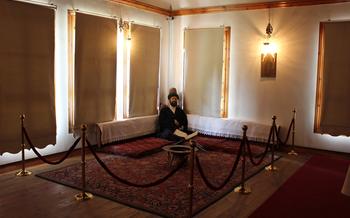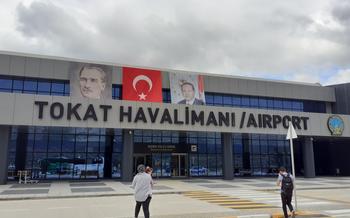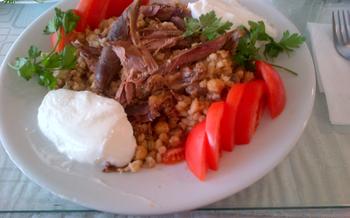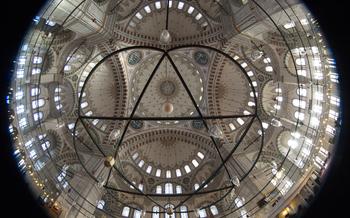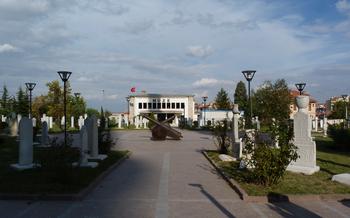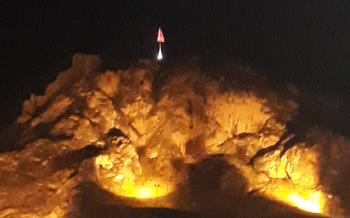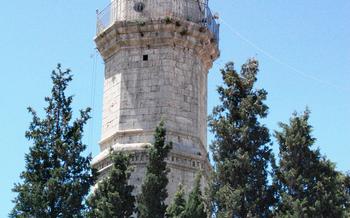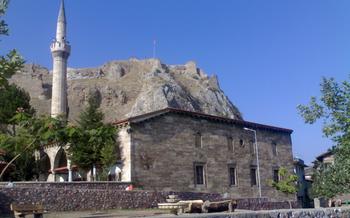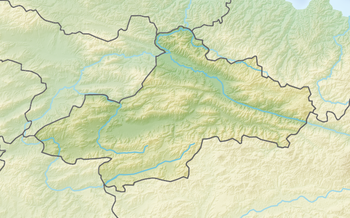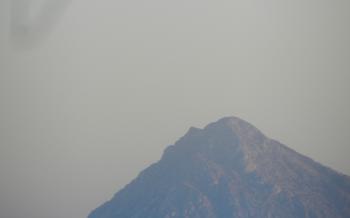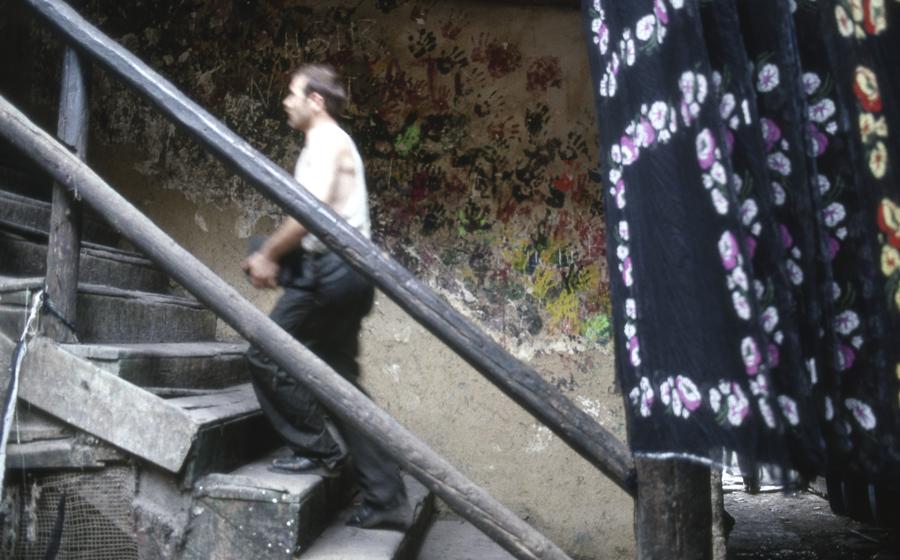
Tokat Pervane Medrese
- Tokat Pervane Medrese: A Historical and Architectural Gem
- Location: Finding the Tokat Pervane Medrese
- Step Inside: Exploring the Medrese's Interior
- The Founder: Pervane Bey and His Legacy
- Preservation Efforts: Protecting a National Treasure
- Admission and Fees: Planning Your Visit
- Photography Tips: Capturing the Medrese's Beauty
- Nearby Attractions: Exploring Tokat's Other Gems
- Local Cuisine: Tasting Tokat's Delights
- Festivals and Events: Celebrating Tokat's Culture
- Shopping in Tokat: Finding Unique Souvenirs
- Accommodation Options: Where to Stay in Tokat
- Insider Tip: Discovering Hidden Gems
Tokat Pervane Medrese: A Historical and Architectural Gem
In the heart of Tokat, a city steeped in history and culture, lies a remarkable architectural wonder that captivates visitors with its grandeur and historical significance: the Tokat Pervane Medrese. Founded in the 13th century during the Seljuk era, this medrese, or Islamic college, stands as a testament to the city's rich heritage and enduring legacy.
The Tokat Pervane Medrese is a masterpiece of Islamic architecture, showcasing a harmonious blend of Seljuk and Ottoman influences. Its intricate carvings, elegant arches, and stunning tilework reflect the artistic prowess of its creators. Beyond its aesthetic beauty, the medrese holds immense importance as a center of Islamic learning and scholarship.
As an educational institution, the Tokat Pervane Medrese played a pivotal role in disseminating knowledge and fostering intellectual pursuits. Its classrooms and lecture halls buzzed with scholarly debates and discussions, while its library housed a vast collection of Islamic texts and manuscripts. Renowned scholars and students flocked to the medrese, seeking enlightenment and spiritual guidance.
Today, the Tokat Pervane Medrese stands as a testament to the city's enduring commitment to preserving its cultural heritage. Through meticulous restoration and conservation efforts, this architectural gem has been meticulously preserved, allowing visitors to step back in time and experience the grandeur of a bygone era.
Location: Finding the Tokat Pervane Medrese
The Tokat Pervane Medrese is conveniently located in the heart of Tokat city, making it easily accessible to visitors. Its exact address is Pervane Mahallesi, Pervane Caddesi No:23, Tokat. To reach the medrese, you can take advantage of the well-connected public transportation system. Several bus lines, including the No. 11 and No. 12 buses, stop within a short walking distance from the medrese.
For those who prefer to drive, there are limited parking options available in the vicinity of the medrese. It is recommended to arrive early or utilize alternative parking facilities, such as nearby shopping malls or public parking lots, to avoid any inconvenience.
While exploring the area, take the opportunity to visit the nearby Tokat Castle, which offers stunning panoramic views of the city. The Grand Mosque of Tokat, with its impressive architecture, is also worth a visit. For a refreshing break, head to the Sulusokuk Waterfall, located just a short drive from the city center, and enjoy the tranquility of nature.
Step Inside: Exploring the Medrese's Interior
As you enter the Tokat Pervane Medrese, a sense of tranquility and reverence envelops you. The spacious courtyard, adorned with intricate tilework and surrounded by arched corridors, invites you to pause and appreciate the architectural beauty. The classrooms and lecture halls, once buzzing with the energy of eager students, now stand as silent witnesses to the institution's rich history.
In the student living quarters, you can almost imagine the young scholars immersed in their studies, poring over manuscripts and engaging in lively debates. The prayer room, with its serene ambiance, evokes a spiritual connection between the medrese's past and present. And in the library, you can envision the scholars meticulously preserving and expanding the vast repository of knowledge that shaped the minds of generations.
As you wander through the medrese's interior, let your imagination transport you back in time and experience the vibrant intellectual and spiritual atmosphere that once permeated these hallowed halls.
The Founder: Pervane Bey and His Legacy
Pervane Bey, a prominent figure in the Anatolian beyliks, is credited with the construction of the Tokat Pervane Medrese. A man of great wealth and influence, Pervane Bey played a pivotal role in the development of Tokat during the 13th century. His decision to establish a medrese in the city reflects his commitment to education and Islamic scholarship.
Pervane Bey, whose name translates to "moth" or "butterfly," was known for his generosity and benevolence. He was a patron of the arts and sciences, supporting scholars, artists, and students. The construction of the Tokat Pervane Medrese stands as a testament to his dedication to promoting education and preserving Islamic heritage.
Historical anecdotes and stories surrounding Pervane Bey paint a picture of a man who was both powerful and compassionate. It is said that he would often disguise himself as a commoner to walk among the people and understand their needs. His generosity extended beyond the medrese, as he was known for his charitable contributions and support for the poor and needy.
Pervane Bey's legacy continues to inspire generations in Tokat. His contributions to the city, particularly the establishment of the Tokat Pervane Medrese, have left an enduring mark on its cultural and educational landscape.
Preservation Efforts: Protecting a National Treasure
The Tokat Pervane Medrese has withstood the test of time, but it has not been without its challenges. Natural wear and tear, as well as the occasional earthquake, have taken their toll on the structure. In recent years, concerted efforts have been made to preserve and restore this national treasure.
The Turkish government, in collaboration with local authorities and heritage organizations, has undertaken several restoration projects. These projects have focused on repairing structural damage, restoring intricate carvings and tilework, and maintaining the integrity of the medrese's original design.
One of the most significant challenges in preserving the medrese has been balancing the need for restoration with the desire to retain its historical authenticity. Experts have worked meticulously to ensure that repairs and renovations are carried out using traditional techniques and materials, preserving the medrese's original character.
Ongoing maintenance is also crucial to the medrese's preservation. Regular inspections are conducted to identify any potential issues, and preventative measures are taken to prevent further deterioration. The collaboration between government agencies and local communities has been instrumental in ensuring the long-term sustainability of this architectural gem.
Thanks to these preservation efforts, the Tokat Pervane Medrese continues to stand as a testament to the rich history and architectural heritage of Turkey. Its preservation is a testament to the country's commitment to protecting and celebrating its cultural treasures for generations to come.
Admission and Fees: Planning Your Visit
Admission to the Tokat Pervane Medrese is free of charge, allowing visitors to explore its historical and architectural wonders without any financial barriers. This makes it an accessible and inviting destination for travelers of all backgrounds. The medrese is open to the public every day of the week, except for Mondays, from 8:30 AM to 5:00 PM. Guided tours are available upon request and are conducted in Turkish, English, and German by knowledgeable and enthusiastic guides who can provide in-depth insights into the medrese's history, architecture, and significance. Advance booking for guided tours is recommended, especially during peak tourist seasons, to ensure availability and avoid waiting time.
Photography Tips: Capturing the Medrese's Beauty
The Tokat Pervane Medrese offers a wealth of opportunities for photography enthusiasts. To capture the medrese's beauty at its best, consider the following tips:
-
Best Angles and Lighting Conditions: For exterior shots, aim to position yourself at an angle that showcases the medrese's grandeur against the backdrop of the surrounding cityscape. The morning or late afternoon light provides warm and diffused illumination, enhancing the intricate details of the architecture.
-
Interesting Details and Elements: Look for captivating elements such as the ornate carvings on the portal, the graceful arches of the courtyard, and the intricate tilework adorning the walls. Close-up shots of these details can yield striking and visually appealing images.
-
Tripod Usage and Shutter Speed: To minimize camera shake and ensure sharp images, especially in low-light conditions, use a tripod. Experiment with different shutter speeds to capture the desired effect, whether it's freezing motion or creating a sense of movement.
-
Editing Tips: Utilize photo editing software to enhance your images. Adjust the contrast and brightness to bring out the depth and richness of the architecture. Cropping and straightening tools can help improve the composition and remove unwanted distractions.
Nearby Attractions: Exploring Tokat's Other Gems
Tokat is a treasure trove of historical and natural wonders, and a visit to the Tokat Pervane Medrese is just the beginning. Take some time to explore other fascinating attractions that this charming city has to offer.
-
Tokat Castle: Perched atop a hill overlooking the city, Tokat Castle is a magnificent fortress that dates back to the Byzantine era. Explore its imposing walls, towers, and dungeons, and soak in the breathtaking panoramic views of Tokat and the surrounding countryside.
-
Grand Mosque of Tokat: Located in the heart of the city, the Grand Mosque of Tokat is a splendid example of Ottoman architecture. Admire its elegant dome, intricate tilework, and graceful minarets. Step inside to experience the serene atmosphere and marvel at its beautiful interior adorned with calligraphy and colorful Iznik tiles.
-
Sulusokuk Waterfall: Escape the hustle and bustle of the city with a visit to Sulusokuk Waterfall, a natural wonder located just a short drive from Tokat. Surrounded by lush greenery and cascading down a rocky cliff, this breathtaking waterfall offers a tranquil and refreshing retreat.
-
Museums and Historical Sites: Tokat is home to several fascinating museums and historical sites that shed light on its rich past. Visit the Tokat Museum to learn about the city's history and culture, or explore the Tokat Ethnography Museum for a glimpse into traditional Turkish lifestyles. Don't miss the Armenian Church, a beautifully preserved historical monument that adds to the city's diverse cultural heritage.
Local Cuisine: Tasting Tokat's Delights
Tokat's cuisine is a reflection of its rich history and cultural influences. Here, you can savor the flavors of Anatolian and Turkish culinary traditions, with a focus on fresh, seasonal ingredients and hearty dishes. One must-try specialty is Tokat kebabı, a succulent lamb dish cooked on skewers over an open fire. The tender meat is marinated in a blend of spices and yogurt, resulting in a delectable taste that will tantalize your taste buds.
For a vegetarian delight, indulge in Tokat's version of gözleme, a traditional Turkish flatbread stuffed with a variety of fillings. The gözleme here is known for its crispy exterior and flavorful fillings, such as spinach, cheese, or minced meat.
No culinary exploration of Tokat is complete without sampling the local tatlılar (desserts). Tokat is renowned for its künefe, a shredded wheat pastry filled with melted cheese and drizzled with sweet syrup. Another popular dessert is Tokat dondurması, a unique ice cream made with sahlep, a special orchid root powder that gives it a distinctive stretchy texture and nutty flavor.
When in Tokat, be sure to visit the local markets and bazaars to immerse yourself in the vibrant culinary scene. These bustling marketplaces offer a treasure trove of fresh produce, spices, and traditional delicacies. You can also find authentic Tokat handicrafts and souvenirs to take home as a reminder of your visit.
Whether you're a food enthusiast or simply looking for a taste of local culture, Tokat's culinary delights are sure to satisfy your cravings and leave you with lasting memories of this vibrant city.
Festivals and Events: Celebrating Tokat's Culture
Tokat's vibrant culture and heritage come alive during its annual festivals and cultural events. These celebrations offer a unique opportunity to witness traditional Turkish performances, music, dance, and customs. The city's most famous festival is the Tokat International Folklore Festival, held every July. This colorful event showcases folk dance groups from around the world, creating a lively atmosphere in the city streets.
Another popular event is the Tokat Grape Festival, held in September to celebrate the region's rich viticulture. Visitors can indulge in local grape varieties, sample traditional dishes, and enjoy grape-themed activities. For those interested in history and culture, the Tokat Cultural Heritage Festival, held in May, offers a glimpse into the city's past with exhibitions, workshops, and guided tours of historical sites.
Insider Tip: To fully immerse yourself in the festival experience, dress in traditional Turkish attire. This will not only enhance your enjoyment but also show your respect for local customs and traditions.
Shopping in Tokat: Finding Unique Souvenirs
Tokat is a treasure trove of traditional handicrafts and souvenirs that reflect its rich cultural heritage. To find authentic and unique items, head to the local markets and bazaars, where you can immerse yourself in the vibrant atmosphere and haggle for the best prices.
Among the must-haves are handwoven carpets and kilims, intricately patterned with motifs and colors that tell stories of the region. Copperware and brassware, handcrafted by local artisans, make for beautiful decorative pieces or functional souvenirs. For something truly special, look for Tokat's signature pottery, known for its distinctive blue and white designs.
When shopping in Tokat, don't be afraid to bargain. It's a customary part of the shopping experience, and you can often get a good deal if you're willing to negotiate. Just be respectful and friendly, and remember that the prices are usually set with some wiggle room.
By supporting local artisans and shopping at these traditional markets, you're not only taking home a piece of Tokat's culture but also contributing to the preservation of its heritage. So, whether you're looking for a unique gift or a special souvenir to remember your trip, Tokat's markets and bazaars are a must-visit.
Accommodation Options: Where to Stay in Tokat
When planning your trip to Tokat and your visit to the Tokat Pervane Medrese, finding suitable accommodation is essential. To make the most of your experience, consider staying in one of the hotels or guesthouses located near the medrese. This will allow you to easily explore the city's historical center and other attractions on foot.
Several reputable hotels are within walking distance of the medrese, offering a range of amenities and services to suit different budgets and preferences. Look for hotels with comfortable rooms, convenient facilities, and friendly staff to ensure a pleasant stay.
For budget-conscious travelers, there are several guesthouses and hostels that offer affordable accommodation options. These guesthouses often provide a more local experience, allowing you to interact with Turkish hospitality and learn about the city's culture.
When choosing your accommodation, consider factors such as location, amenities, and budget. Advance booking is recommended, especially during peak tourist season, to secure your preferred choice and avoid disappointment.
Here are some tips for booking accommodation in Tokat:
- Check online booking platforms and travel websites to compare prices and read reviews from previous guests.
- Consider the location of the accommodation in relation to the medrese and other attractions you plan to visit.
- Look for hotels or guesthouses that offer amenities such as breakfast, Wi-Fi, and air conditioning.
- If you're on a tight budget, explore the options of hostels or guesthouses that provide basic but comfortable accommodation.
- Book your accommodation in advance, especially if you're traveling during the high season (June-August) or during festivals and events.
Insider Tip: Discovering Hidden Gems
Beyond the well-known attractions, Tokat offers a treasure trove of hidden gems waiting to be discovered by curious travelers. For those seeking unique experiences, here are some insider recommendations:
-
Uncover the Enchanting Sulusokuk Waterfall: A short drive from the city center, this cascading waterfall surrounded by lush greenery offers a tranquil escape from the hustle and bustle. Pack a picnic and enjoy a serene afternoon amidst nature's beauty.
-
Explore the Tokat Museum of Archaeology and Ethnography: This lesser-known museum houses an impressive collection of artifacts showcasing the region's rich history and cultural heritage. From ancient pottery to traditional textiles, the exhibits provide a fascinating glimpse into Tokat's past.
-
Indulge in Local Delights at the Tokat Pazarı: Immerse yourself in the vibrant atmosphere of this traditional market, where you can find an array of fresh produce, spices, and local specialties. Don't miss the chance to sample Tokat's famous keşkek, a hearty dish made from pounded wheat and meat.
-
Discover the Hidden Mosque of Hızır Bey: Tucked away in a quiet neighborhood, this small but exquisite mosque boasts stunning tilework and intricate carvings. Its peaceful ambiance invites you to pause and appreciate the beauty of Islamic architecture.
-
Embark on a Culinary Adventure with Tokat's Street Food: Venture into the city's backstreets and savor the delicious offerings of local food stalls. From freshly grilled kebabs to traditional Turkish desserts, there's a culinary delight waiting for every palate.
With these insider tips, you can unlock the hidden treasures of Tokat and create unforgettable memories that will stay with you long after your visit.
